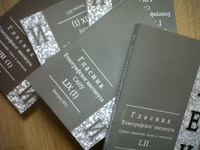Gypsy Ethnic Socialization in Serbia
УДК 39(214.58) 316.728(=214.58)(497.11) 323.15(=214.58)(497.11)
Сажетак
Based on original fieldwork among Gypsies in Serbia, this paper explores Gypsy ethnic socialization and argues that Gypsy social isolation, to some extent, is self-imposed through the acceptance of their traditions. Close kin, particularly parents, are found to be the primary socializing agents of Gypsy children. Gypsy children have little or no contact with children from other ethnic groups. A crucial aspect of Gypsy socialization is an emphasis on the distinction between non-Gypsies and Gypsies; that is, between gadje and Roma: Contact with gadje, especially sexual, is considered polluting. Their social isolation results also from their traditional refusal to accept, and become a part of the larger hierarchy of their host populations. The Gypsy tradition of endogamy helped individual Gypsies to survive, leave descendants, and transmit their traditions to them.
Key words: Gypsies, ethnic socialization, traditions, Serbia.
<https://www.ei.sanu.ac.rs/index.php/gei/article/view/694>.
Датум приступа: 20 apr. 2024






